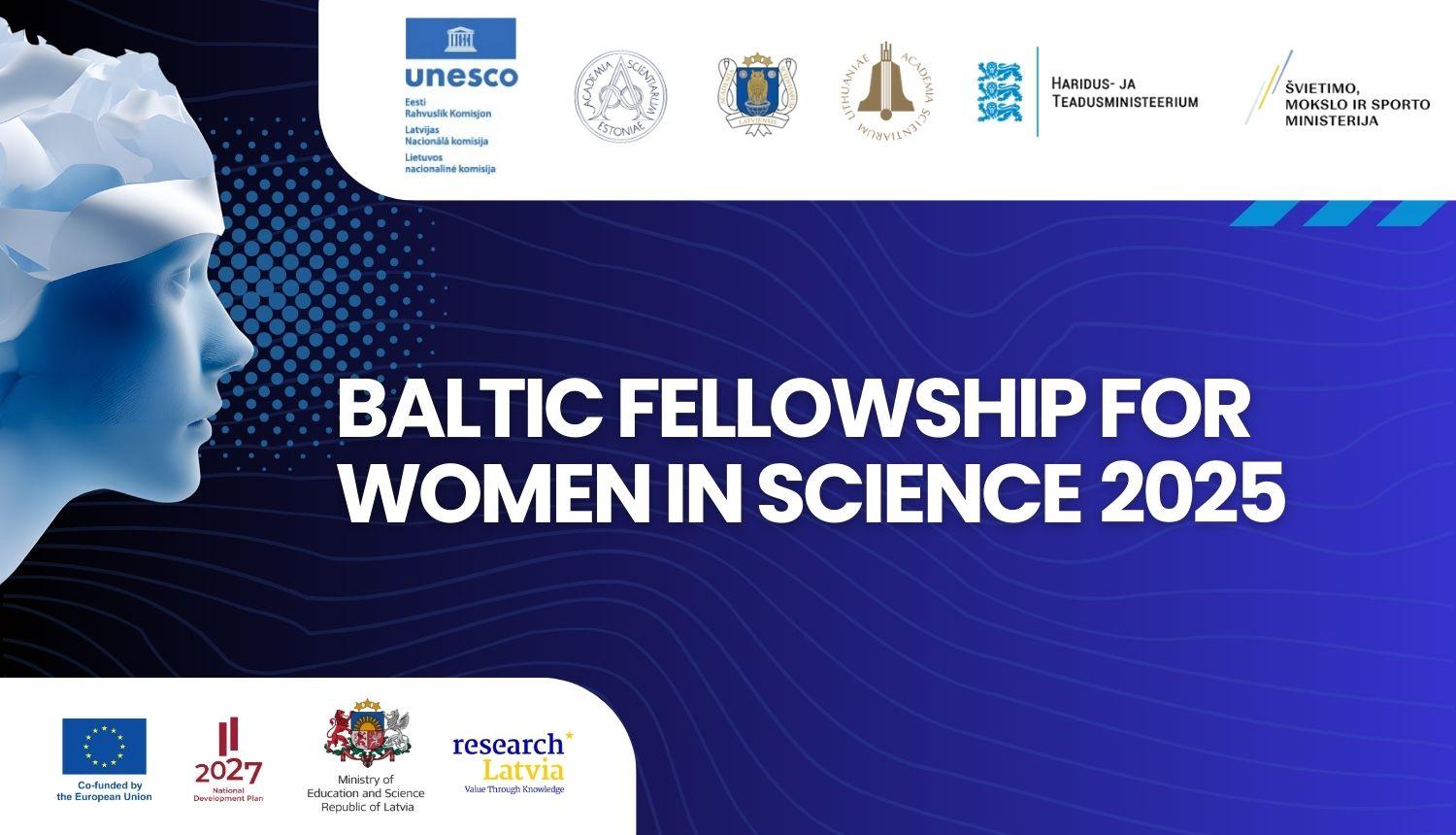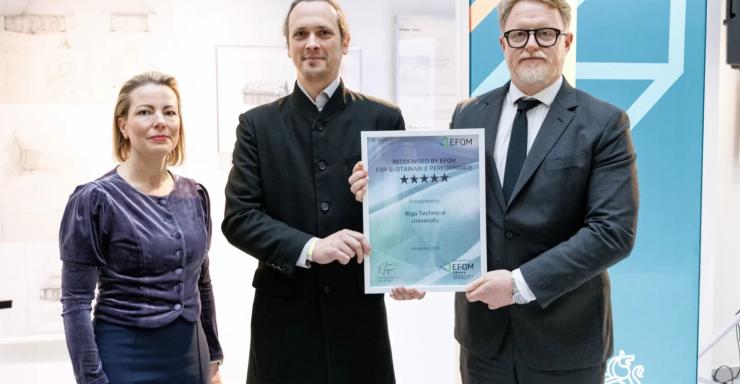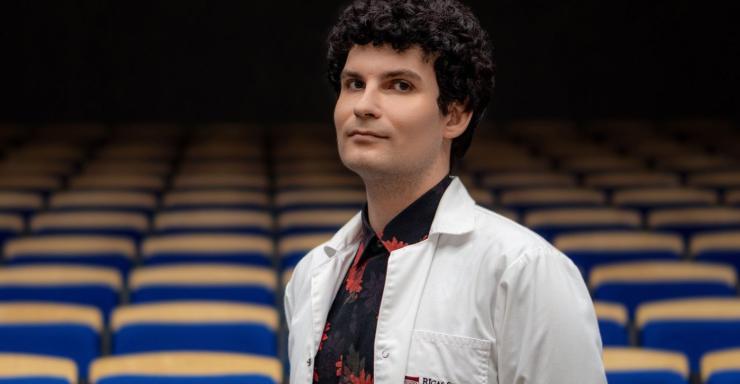Today, on 27 November, the award ceremony for the “Baltic Fellowship for Women in Science 2025” laureates will take place at the Latvian Academy of Sciences. For the second year in a row, the academies of sciences of Estonia, Latvia, and Lithuania, in cooperation with the UNESCO National Commissions, have announced a joint fellowship competition for women scientists. This year, a total of 167 applications were submitted across all Baltic states.
Event live stream:
The fellowship aims to support the most promising young women researchers in the Baltic states on their path toward scientific excellence, to promote the achievements of emerging women scientists, and to encourage talented female students to pursue careers in science.
In Latvia, two fellowships were awarded in the fields of natural sciences, engineering and technology, and medical and health sciences, one to a researcher with a doctoral degree and one to a doctoral candidate, as well as one fellowship to a researcher with a doctoral degree in the fields of social sciences and the humanities.
In Latvia, 13 doctoral candidates and 38 researchers with postgraduate degrees submitted applications, for a total of 51 submissions, compared to 63 last year.
In Estonia and Lithuania, two fellowships were awarded this year to researchers with doctoral degrees and two to doctoral candidates in the fields of natural sciences, engineering and technology, medical and health sciences, and agricultural and veterinary sciences, as well as two fellowships to researchers with doctoral degrees in social sciences and the humanities.
In Estonia, 38 applications were submitted in total (19 by doctoral candidates and 19 by PhD holders), compared to 29 submissions in 2024. Meanwhile, in Lithuania, 78 applications were received (19 from doctoral candidates and 59 from PhD holders, including 20 from social sciences and humanities), marking a record number compared to 51 last year.
Each laureate receives a fellowship of EUR 7,000, funded by the Ministry of Education and Science of Latvia, the Ministry of Education and Research of Estonia, and the Ministry of Education, Science and Sport of Lithuania.

LATVIA
Monta Brīvība (Dr. biol., Latvian Biomedical Research and Study Centre) received the fellowship in the doctoral category of medical and health sciences. Her research focuses primarily on genomics and precision medicine, particularly on studying the genome of the Latvian population and integrating genomic data into healthcare. Monta is actively involved in developing the Latvian genome reference and the European 1+ Million Genomes Initiative, which lays the foundation for more accurate interpretation of genomic data in both research and clinical practice. Integrating genomic data into healthcare can significantly improve diagnostics and treatment outcomes in cases such as type 2 diabetes and high cholesterol, as well as in complex diseases like cancer.
Elīna Pavlovska (Mg. phys., University of Latvia) received the fellowship in the doctoral candidate category in natural sciences, engineering, and technology. During her postgraduate studies, she developed a model describing electron behaviour in collider-type devices and designed methods to reveal electrons’ unique “fingerprints,” which are characteristic of specific phases of matter. This enables the identification of collective states in few-electron systems by analysing correlations between electron-scattering outcomes in nanocollider detectors. The results of this research were published on 25 June 2025 in the prestigious academic journal Nature.
The fellowship in the doctoral category of humanities and social sciences was awarded to Jana Kukaine (Dr. art., Rīga Stradiņš University). She is Latvia’s leading researcher in feminist theory and feminist art, a pioneer and developer of this field for more than a decade. Her most notable achievements include scientific articles, book chapters published by Routledge and Bloomsbury Academic, and two monographs in Latvian. She is currently implementing a postdoctoral project on plant agency in Latvian contemporary art. Kukaine’s research interests synthesise insights from feminist and environmental humanities, seeking theoretical tools to highlight the specificity of art in the Baltic region.
ESTONIA
Renu Geetha Bai (PhD, Estonian University of Life Sciences) received the fellowship in the doctoral category of natural sciences, including environmental sciences, for developing an algae-based “nano-shield”, a nanocapsulated astaxanthin–fucoidan formula that enhances the positive properties of both components while reducing their limitations, to prevent photodamage and reduce skin cancer risk.
Katriin Reedo (MSc, Tallinn University of Technology) received the fellowship in the doctoral candidate category in engineering and technology for research that will significantly advance the understanding and improvement of pyrite solar cells. This new technology is the most cost-effective photovoltaic technology available today. Her discoveries will play an essential role in improving access to sustainable energy, reducing the costs of solar technologies, and, in cooperation with the European Space Agency, introducing a new class of photovoltaic materials for space applications.
Kerttu Rozenvalde (PhD, University of Tartu) received the fellowship in the doctoral category of humanities and arts for research on the use of English as a medium of instruction at the University of Tartu, how students navigate English in the university environment, how they perceive their linguistic competence in relation to (implicit) language requirements, and how this experience reflects hidden language policies in the context of higher education in Estonia.
LITHUANIA
The fellowship in the doctoral category of natural sciences was awarded to Mažena Mackoit-Sinkevičienė (Dr., Institute of Theoretical Physics and Astronomy, Vilnius University). She is interested in the development of quantum technologies, studying how vortex light interacts with atomic particles. Her research first examines how such light evolves in an atomic medium, enabling more precise control of its properties. She then studies the use of ultracold atomic systems and optical lattices to generate spin-squeezed quantum states that will allow more accurate measurements than conventional methods. By optimising atom configurations, the efficiency of producing these states improves, marking an important step toward next-generation quantum sensors and clocks.
The fellowship in the doctoral candidate category of agricultural and forestry sciences was awarded to Greta Striganavičiūtė (MSc, Institute of Forestry, Lithuanian Research Centre for Agriculture and Forestry). She studies how trees respond to polycyclic aromatic hydrocarbons (PAHs), harmful environmental pollutants that accumulate in forest ecosystems. By combining tree genetic diversity with PAH-degrading and growth-promoting microbes, she evaluates physiological responses under pollutant stress. Some tree lineages exhibit enhanced antioxidant protection and improved growth when inoculated with specific microbes. These findings underscore the importance of strategic tree–microbe pairings to develop biotechnological approaches for restoring PAH-contaminated forests in the Baltic region.
The fellowship in the doctoral category of social sciences and humanities was awarded to Rūta Ubarevičienė (Dr., Institute of Sociology, Lithuanian Centre for Social Sciences). She participates in several interconnected research initiatives focusing on the interplay between migration and segregation, issues of growing importance both in Lithuania and globally. Rūta aims to link scientific insights with public discourse and policy development. She plans to: (1) expand her team by mentoring doctoral students and collaborating with emerging researchers, (2) maximise the scientific potential of Lithuania’s underused data infrastructure, and (3) establish an international network of segregation researchers through the creation of the e-platform SegregationLab.com.
The award ceremony will take place at the Latvian Academy of Sciences in Riga on 27 November and will be streamed live on the UNESCO LNC and LAS YouTube channels from 13:00. The working language of the ceremony is English.
About the Baltic Fellowship for Women in Science
The fellowship was established in 2024 by the Latvian Academy of Sciences, the Estonian Academy of Sciences, and the Lithuanian Academy of Sciences in cooperation with the UNESCO National Commissions of Latvia, Estonia, and Lithuania. Its purpose is to recognise and support the most outstanding young women researchers in the Baltic states through national competitions, to promote the achievements of emerging women scientists, and to encourage talented female students to pursue scientific careers.
The 2024 laureates were: Mari Tõrv, Kadri-Ann Pankratov, Marju Himma (Estonia); Anne Sauka, Daniela Godiņa, Līga Ignatāne (Latvia); Greta Varkalaitė, Šarūnė Daškevičiūtė, Viltė Janušauskaitė (Lithuania).
The award ceremony is being held within the framework of the project No. 1.1.1.1/1/24/I/001 “More efficient and smarter implementation and management of Latvian science policy” implemented by the Ministry of Education and Science.



